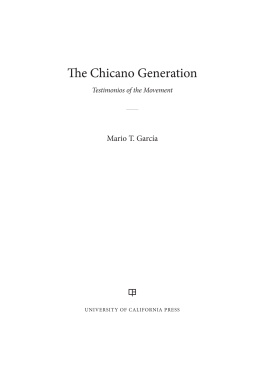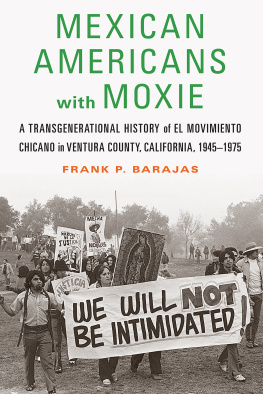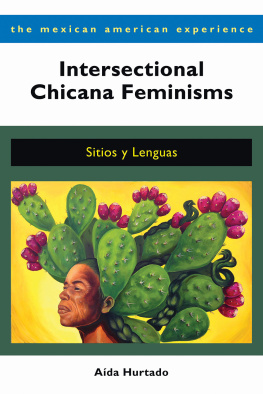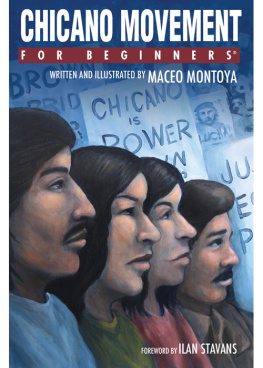CHICANA MATTERS SERIES, DEENA J. GONZLEZ AND ANTONIA CASTAEDA, EDITORS
Chicana Matters Series focuses on one of the largest population groups in the United States today, documenting the lives, values, philosophies, and artistry of contemporary Chicanas. Books in this series may be richly diverse, reflecting the experiences of Chicanas themselves, and incorporating a broad spectrum of topics and fields of inquiry. Cumulatively, the books represent the leading knowledge and scholarship in a significant and growing field of research and, along with the literary works, art, and activism of Chicanas, underscore their significance in the history and culture of the United States.
CHICANA POWER!
Contested Histories of Feminism in the Chicano Movement
MAYLEI BLACKWELL

UNIVERSITY OF TEXAS PRESS
Austin
Copyright 2011 by the University of Texas Press
All rights reserved
Sixth paperback printing, 2015
Requests for permission to reproduce material from this work should be sent to:
Permissions
University of Texas Press
P.O. Box 7819
Austin, TX 78713-7819
http://utpress.utexas.edu/index.php/rp-form
Earlier versions of chapter 3 were published as Bearing Bandoleras: Transfigurative Liberation and the Iconography of la Nueva Chicana, in Beyond the Frame: Women of Color and Visual Representations, eds. Neferti X. M. Tadiar and Angela Y. Davis (New York: Palgrave, 2005), 171196, reprinted with permission of Palgrave Macmillan, and Contested Histories: las Hijas de Cuauhtmoc, Chicana Feminisms and Print Culture in the Chicano Movement, 19681973, in Chicana Feminisms: A Critical Reader, eds. Gabriela Arredondo, Ada Hurtado, Norma Klahn, Olga Njera-Ramrez, and Patricia Zavella (Durham, NC: Duke University Press, 2003), 5989, reprinted with permission.
LIBRARY OF CONGRESS CATALOGING-IN-PUBLICATION DATA
Blackwell, Maylei, 1969
Chicana power! : contested histories of feminism in the Chicano movement / by Maylei Blackwell. 1st ed.
p. cm. (Chicana matters series)
Includes bibliographical references and index.
ISBN 978-0-292-72690-1 (pbk. : alk. paper)
1. Mexican American women. 2. FeminismUnited States. 3. Women political activistsUnited States. I. Title.
E184.M5B55 2011
305.4886872073dc22
2011006831
doi:10.7560/725881
CONTENTS
ACKNOWLEDGMENTS
I was taught in the Cherokee way to believe that stories have power: the power to inspire, the power to heal, the power to transform, the power to incite new possibilities, in fact, to create new worlds. I learned to be an oral historian by witnessing the stories of my family. I became a holder of stories, listening to the narratives that wove me into generations across the long march, relocation days, and the time before creating an umbilicus to those who dreamt me into being. I also grew up, like many sons and daughters of migrants, with my father in a distant land (Thailand, to be precise). Stories of him connected me across continents, linking me to a sense of belonging that formed an amulet of protection for my heart in the context where my difference and the color of my skin made me a target of racism.
The stories at the center of this book have power. When I first started hearing these stories, I was a waitress, a student, and an activist. As a young, woman of color feminist, these stories connected me to a genealogy and a knowledge that the battles we were fighting others had fought before us. Now twenty years later, they connect me to a hope that others will be inspired and transformed by these new stories.
What you are holding in your hands is the result of a journey twenty years in the making. Along the way many, many have offered their insights, their labor, their inspiration, and their encouragement. First and foremost I thank Anna NietoGomez for her enduring work in formulating Chicana feminist theory and practice, for her uncompromised view of social justice and her courage in articulating early on the inseparability of race, class, and gender oppressions. I thank her for sharing her story, for the many conversations that now span decades, and for all the care she took in reading the manuscript cover to cover. I also thank the many others who shared their stories and critical reflections with me, especially Leticia Hernndez, Sylvia Castillo, Corinne Snchez, Cecelia Quijano, Martha Cotera, Keta Miranda, Betita Martinez, Elma Barrera, Gloria Guardiola, and Yolanda Birdwell. I acknowledge those activists such as Norma Owens and Cindy Honesto, who are not present to tell their story, but whose stories are central to this history.
At California State University, Long Beach, Sherna Gluck inspired me with her critical mind and fierce sense of justice. Our conversations on feminist historiography and oral history have continued off and on for twenty years. I also thank Norma Chinchilla, Sharon Sievers, Kathryn MacMahon, Federico Snchez (who taught the first Chicano History class I attended), Chanzo Nettles, Rex Gilliland, Adrienne Carrier, Alicia Nevarez, and the Students for Peace and Justice. I met Dr. Antonia Castaeda and Dr. Vicki Ruiz in 1992 in Chicago at an OAH panel and even as an undergraduate, they received with me warmth and have offered their support and tireless encouragement throughout the many years of this project. The community formed by all the activists and scholars of Mujeres Activas en Letras y Cambio Social have supported my development as a scholar and this book since its inception.
At UC Santa Cruz, I thank Angela Davis, who served as my advisor throughout my doctoral training in the History of Consciousness Department. She so firmly believed in me that I had to relinquish my own self-doubt and figure out how to try to live up to her expectations of me. I thank her for continuing to walk and weave a path of activism and scholarship and encouraging us to bring our social justice concerns centrally into our intellectual labor, instead of doing activism on the side. I would like to thank Patricia Zavella for her grounded vision of Chicana feminisms as well as her dedication to her students, myself included, who she has mentored for over ten years. In 1997, I was told by my Qualifying Exam committee that I would pass the exam on one condition. As I held my breath, they told me that they would pass me only if I agreed to publish the material as a book manuscript. So in some sense, I am finally passing my qualifying exam. I thank the amazing community of scholars who trained me including Sonia Alvarez, Rosa Linda Fregoso, and Jonathan Fox. Thank you to Norma Klahn and Pedro Castillo for their work in creating the intellectual space provided by the Chicano/Latino Resource Center at UCSC as well as those who forged critical dialogues Latin American and Latino Studies at UCSC. I thank Guillermo Delgado, Donna Harraway, Nancy Chen, Olga Njera Ramirez, Ada Hurtado, Jim Clifford, Neferti Tadiar, and Rosie Cabrera. I was lucky to be able to study with Chicana feminist historian Emma Prez as a visiting professor and thank her for pushing us to move beyond established paradigms and to create new epistemologies in the archaeology of Chicana feminisms.
I am grateful for research funding and support I received from the Pre-Doctoral Scholars Program of the California State University Office of the Chancellor, the Chicano/Latino Research Center at UC Santa Cruz for summer research funding and the opportunity to present my research for the first time, the History of Consciousness Department, the Womens Studies Dissertation at the University of California, Santa Barbara, the Summer Faculty Research Grant at Loyola Marymount University, and the Career Enhancement Fellowship of the Woodrow Wilson National Foundation. I thank Norma Alarcn, who served as my mentor for the UC Presidents Postdoctoral Fellowship Program, as well as Kimberly M. Adkinson and Sheila ORourke. At UCLA, this research was generously supported by the Institute for American Cultures, the Chicano Studies Research Center, the Committee on Research of the Academic Senate, the Chancellors Office for Faculty Diversity, and Reynaldo Macias in his role as the Acting Dean of Social Sciences.
Next page





